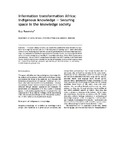Please use this identifier to cite or link to this item:
http://hdl.handle.net/10311/489Full metadata record
| DC Field | Value | Language |
|---|---|---|
| dc.contributor.author | Raseroka, K. | - |
| dc.date.accessioned | 2010-06-08T10:04:29Z | - |
| dc.date.available | 2010-06-08T10:04:29Z | - |
| dc.date.issued | 2008 | - |
| dc.identifier.citation | Raseroka, K. (2008) Information transformation Africa: indigenous knowledge - securing space in the knowledge society, The International Information and Library Review, Vol. 40, pp. 243-250 | en_US |
| dc.identifier.issn | 1057-2317 | - |
| dc.identifier.uri | http://hdl.handle.net/10311/489 | - |
| dc.description.abstract | This paper reflects on factors that need to be considered for establishment of an equitable knowledge society that will secure the Indigenous Knowledge space. While information communication technology facilitates the capture of a predominantly oral-based indigenous knowledge, its contribution to exploitative approaches to information access, also encourages the development of such knowledge as a commodity for competitive advantage, a factor that requires serious consideration. The basis for this consideration should be the World Summit on the information Society (WSIS) Principles which provide the promise of equitable access to information as a base for creation of the knowledge society through ethically grounded information use and sharing. ª 2008 Published by Elsevier Ltd. | en_US |
| dc.language.iso | en | en_US |
| dc.publisher | Elsevier, http://www.elsevier.com | en_US |
| dc.subject | Africa | en_US |
| dc.subject | Indigenous knowledge | en_US |
| dc.subject | Information transformation | en_US |
| dc.subject | knowledge | en_US |
| dc.subject | society | en_US |
| dc.title | Information transformation Africa: indigenous knowledge - securing space in the knowledge society | en_US |
| dc.type | Published Article | en_US |
| Appears in Collections: | Research articles (Dept of Library and Information Studies) | |
Files in This Item:
| File | Description | Size | Format | |
|---|---|---|---|---|
| Raseroka_IILR_2008.pdf | 1.06 MB | Adobe PDF |  View/Open |
Items in DSpace are protected by copyright, with all rights reserved, unless otherwise indicated.
